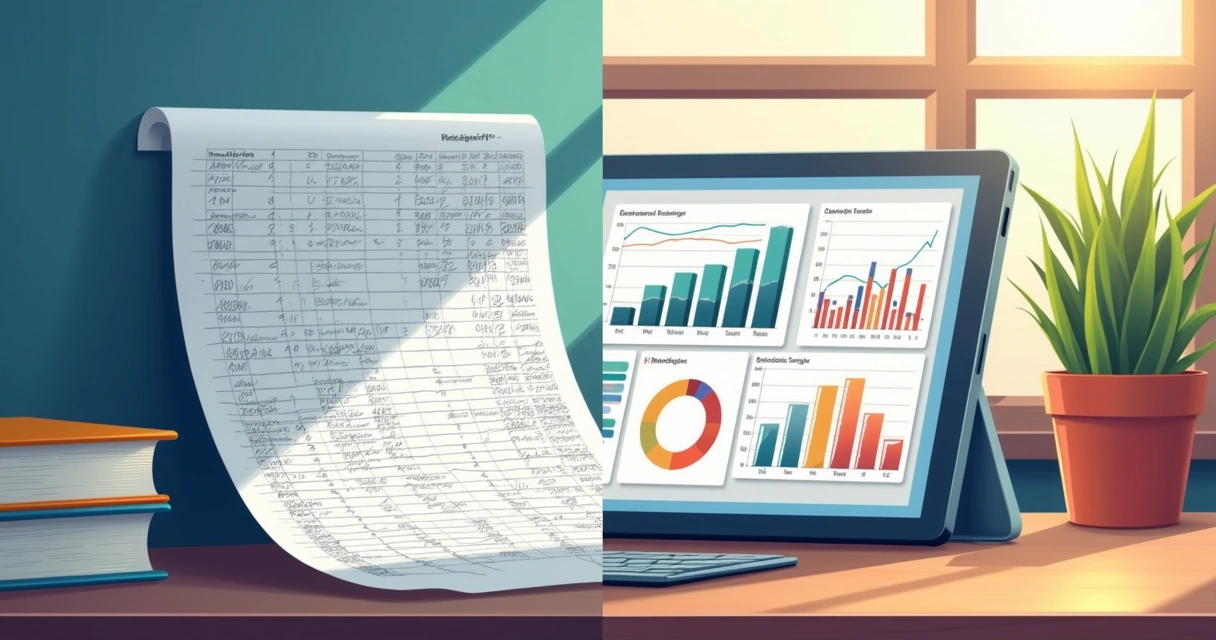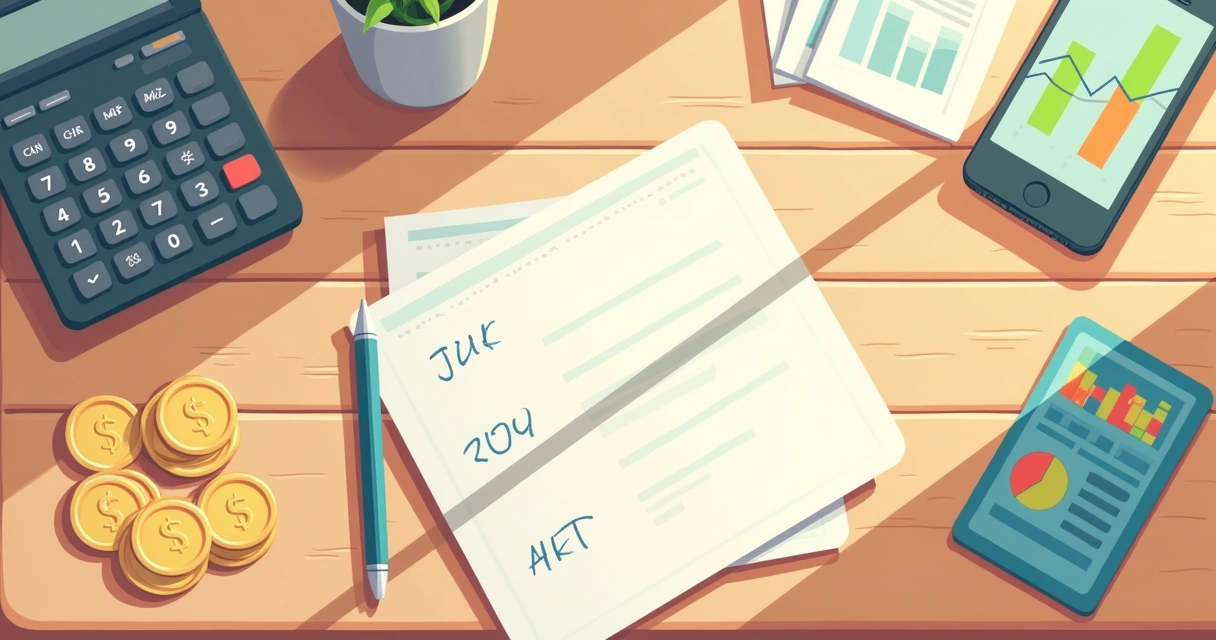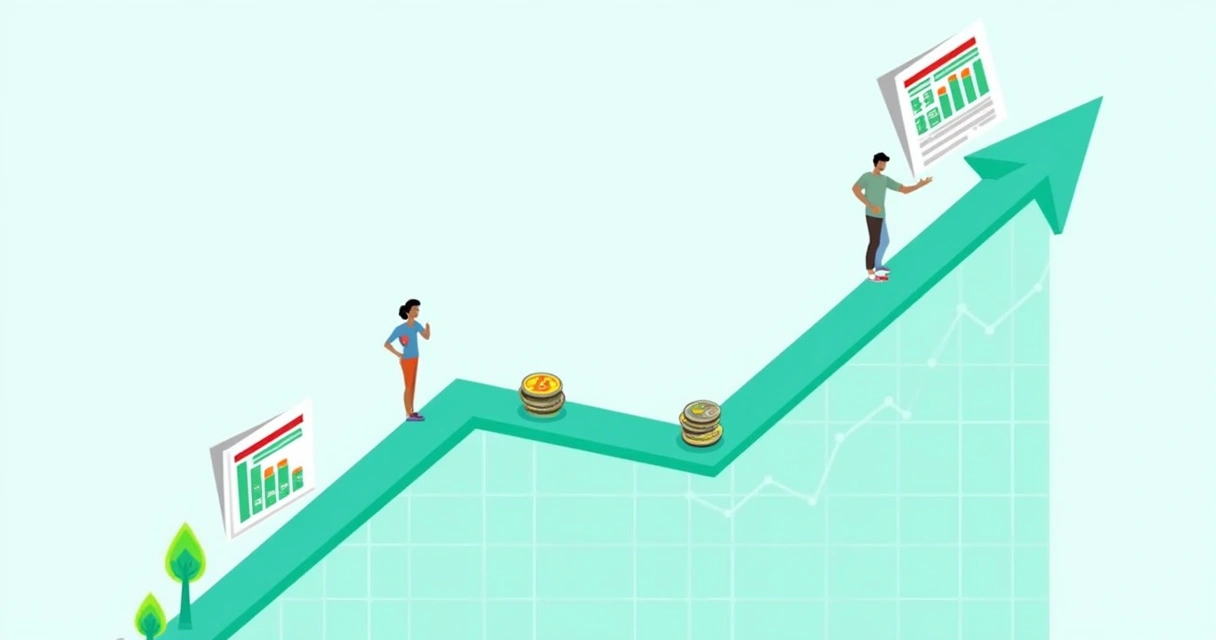Financial Spreadsheets vs. Apps: Which One Should You Use?
May 16, 2025
Somewhere on a quiet Sunday night, a cup of coffee half-finished, you might find yourself staring at a grid of numbers in a spreadsheet. Maybe you sigh. Maybe those rows and columns give you comfort. Or perhaps you look at your phone, see a colorful app icon, and wonder if there’s an easier way. There’s a tension here—a very personal divide in how we handle something as private as money.
I’ve bumped into this same fork in the road, too. Spreadsheets on one hand, apps on the other. Each camp has vocal defenders and hesitant doubters. The truth? It’s not a showdown with a simple winner. Still, your financial story deserves the right tools, and what works for one person might make another roll their eyes.
So, which should you use—classic spreadsheets or modern financial apps? I’ll walk you through the ponderings, quirks, and surprises on both sides. It’s not just facts and stats here; it’s what really feels right in your everyday.
Why we track finances anyway
Is it about being rich? Not really. It’s the peace that comes from knowing where your money goes—and, sometimes more importantly, where it disappears.
- To avoid spending more than you earn
- To hit those goals: trips, homes, debt freedom
- To stay out of trouble with taxes or bills
- To spot leaks and plug them before they become a flood
There’s another layer here. Some track every cent, others just want an occasional check-in. That’s where choosing the right tool gets tricky—neither spreadsheets nor apps are perfect for everyone.

The case for spreadsheets
Spreadsheets have been around for ages. Some folks, including me during certain years, swear by them. When you make a mistake, there’s nobody to blame but yourself—and sometimes, oddly, that’s reassuring.
Control and customization
With a spreadsheet, every cell is yours to shape. You can create a wild web of formulas, make custom charts, and personalize everything, from headers to colors. No two budgets look the same. For some, that level of direct control is almost therapeutic.
A survey cited by Tiller found that millions (about 24 million Americans) use spreadsheets as their main personal finance tool. Nearly 9 in 10 say they feel more “in control” using them compared to apps. That matters, especially for folks who like to see every penny mapped out.
Total ownership and security
When you use a spreadsheet offline, it’s just you and your machine. Nothing leaps to the cloud unless you say so. If you’re wary of who sees your bank balances, that’s a big plus.
You hold your own keys. You decide who sees your details.
Flexibility for every scenario
Do you have odd income sources? Weird categories? Want to track two businesses and a side hustle all in one place? No app is ever perfect for this. But a spreadsheet? Easy—at least, if you don’t mind rolling up your sleeves.
The challenges with spreadsheets
There’s a flip side, of course. Setting it up takes time. Maintaining it? More time. If you hate formulas, miss a decimal, or forget to double-check, errors sneak in. Don’t think it can’t happen. Even pros get tripped up, which is maybe why, according to a study from arXiv, more than half of financial reporting by professionals is still done with spreadsheets.
And here’s a practical snag, especially if you dream big or simply collect a lot of data: A study from Tadabase shows that 80% of spreadsheet users hit walls with scalability. Large data sets become hard to manage. That sprawling spreadsheet you love? It can turn on you as you grow.
- Manual entry and updates are tiring
- Errors happen—sometimes silently
- Sharing can get awkward (emails back and forth, weird versioning)
- Upgrading or integrating with other tools isn’t natural
The promise and perks of financial apps
Let’s switch lanes for a minute. Financial apps—like those you’ll find in app stores or online, including the approach taken by rich-dude.com.br—promise a quicker, sometimes friendlier experience. They often look sleek, with dashboards that offer at-a-glance comfort. They import data, link accounts, and spit out automatic charts.
A few taps, and you see your entire month in bright colors.
Automation: the big sell
The obvious advantage? Less manual work. This is huge. You link your bank account, your credit card, maybe even your investments. Transactions show up automatically. The headaches over typos and forgotten entries sloooowly fade.
If you value your time, consider that research from QuickBooks suggests that three out of four customers believe apps save more time than spreadsheets. And time, after all, is probably our most limited resource.
Visual dashboards and reminders
Apps shine in how they present your data. No hunting through tabs. Your spending, progress toward savings goals, and upcoming bills often live just a tap away. Some send gentle—or aggressive—reminders to nudge you in the right direction.
Maybe you don’t like bright notifications at midnight; that’s one of those “your mileage may vary” issues.
Help for different personalities
Apps come in flavors for everyone: those who want deep analytics; those who only need basic budgeting; folks who want to split bills or track subscriptions. Many, like what rich-dude.com.br aims to offer, also have built-in advice, tips, or learning modules for growing your know-how.
Integration with other tools
According to research from Intuit, about 70% of small businesses juggle multiple accounting apps. Why? Because sharing info between tools is quick, and you can connect to services you already use.
- No exporting and importing messy CSV files
- Syncs data wherever you are—phone, tablet, web
- Often connects to banks, wallets, and even payment platforms

Security and privacy: an honest look
Yes, apps take some things off your plate, but they also mean you have to trust someone else with your financial data. Most reputable fintech apps use strong encryption, but even then—your data is outside your PC’s fortress.
- Are you okay with cloud storage?
- How do you feel about sharing credentials, even with secure providers?
- Would two-factor authentication calm your nerves?
It’s not paranoia if you pause before clicking “Connect Bank.” Maybe it’s just being smart.
Downside: loss of control and customization
Here’s where apps sometimes stumble. You get convenience, but you might sacrifice nuance. Some categories are hard to change. Custom reports may be missing. If your needs are anything but typical, an app can feel boxed in.
Updates and new features? They depend on the company and can arrive unexpectedly—or never. And with some apps, if they shut down, you might scramble to rescue your history.
Side by side: what really changes?
It’s easy to talk in circles here. On one side, spreadsheets promise control and customization; on the other, apps offer speed and a smooth experience. But the real-life differences show up in the small things, the boring day-to-day.
What do you reach for when your paycheck lands or a bill surprises you?
Typical spreadsheet fans
- Love detail and direct editing
- Aren’t afraid of formulas or basic code
- Prefer a feeling of privacy—data sticks close to home
- Need a flexible, outside-the-box system
- Are willing to spend more time tracking
Typical app lovers
- Want instant setup and quick wins
- Dislike manual entry (who doesn’t?)
- Value visual dashboards and clear overviews
- Enjoy reminders and notifications
- Appreciate integrations or all-in-one solutions
Who struggles with which?
Maybe you already feel a nudge to one side. Some spreadsheet folks eventually run out of patience or time, switching to an app. Some app users miss the flexibility and break free with a spreadsheet when their needs grow. It’s not always a one-way street.
How error-prone are these tools?
No tool is immune to human error. Miss one formula or drag a cell incorrectly in your spreadsheet, and the whole plan skews. Spreadsheets can be very powerful, but, as the arXiv study points out, they’re also where a majority of professionals make mistakes—sometimes silently.
Apps chase away some of that risk by doing the math for you. But when algorithms go wrong (or an app imports a transaction incorrectly), mistakes still happen. Sometimes errors are less visible because the inner calculations are hidden from users.
So, do you trust yourself more or the app’s creators? That’s another fork in the road.
Costs: what are you really paying?
Spreadsheets? Usually free, or nearly so. Google Sheets, Excel—these often come bundled with your system. The costs show up in your time and learning curve.
Apps? Many are free to try, but the best features typically hide behind a paywall. Subscriptions (monthly or yearly) are standard. You do save time, though—if that’s worth more to you than a few bucks a month, the math can favor apps. Still, it’s always possible to get lost in chasing new, shinier tools and end up paying for tools you barely use.

Accessibility and ease of use
It seems almost too obvious, but not everyone is a spreadsheet wizard. For newcomers, those cells look intimidating. “Where do I put this? Wait, why did that number turn red?” If you already use spreadsheets, though, it feels familiar—like riding a bike.
Apps cater to those who want to skip lessons, to jump right in. The language is plain, the interface made for fingers or thumbs, not for mouse drags. This opens the door for many who avoided budgets for years. Think of older family or very young adults—spreadsheets may never click for them, but a friendly app just might.
Collaboration, sharing, and family budgets
Money is rarely only one person’s concern. Couples, families, even roommates sometimes need to track things together.
- Spreadsheets: Sharing is often clunky, with saves, versions, and sometimes the horror of two people overwriting each other’s work. Unless you set up Google Sheets or similar for live collaboration—then it gets better, but still not foolproof.
- Apps: Many have sharing baked in. You can invite family members, split expenses, and see updates in real time. There’s less friction. Some apps focus almost entirely on group budgeting, a help for households with shared goals.
How growing needs change the game
Maybe you live simply now. But what if you open a side business, inherit a tricky investment, or manage wealth for an aging parent? What worked yesterday might feel wrong tomorrow.
The Tadabase study about scalability says it all: spreadsheets don’t scale well as your needs multiply. Importing more data, combining sheets, or running advanced analysis gets hard—unless you’re basically a spreadsheet architect.
Apps, especially SaaS platforms like rich-dude.com.br, are often updated to handle larger workloads, new accounts, and features. You still need to pick carefully, though, as some focus more on simplicity and might not fit when things get complicated. Sometimes, oddly enough, businesses or power users cycle back to spreadsheets for edge cases or custom systems.

Where does emotion fit in?
Financial choices aren’t always rational. What feels right is often more about personality than logic.
Sometimes a spreadsheet is a safety blanket. Sometimes an app feels like a fresh start.
You might change tools after a job change, a life event, or even a frustrating evening of error messages. I’ve switched from spreadsheets to apps and back again, more than once, depending on how tired or adventurous I felt.
Best of both worlds?
There’s no rule against mixing. Some people use spreadsheets for history or special projects, but an app for daily tracking. Others export data from apps into spreadsheets occasionally, breaking out advanced analysis when the mood strikes.
Even rich-dude.com.br, built for those leaning toward modern app experiences, recognizes that Excel or Google Sheets will always have their place in the financial universe. That’s why some platforms allow importing and exporting to bridge the two styles.
Making your choice yours
You don’t have to marry one option forever. Try one, see how it fits, and switch if your needs or feelings change. The real loss is if you stop tracking money, out of frustration or boredom. Tools only matter if they help you stick with your habits.
Pick the tool that feels like a friend, not a chore.
Conclusion: what’s right for you?
Choosing between financial spreadsheets and apps is less a rigid contest and more like choosing between two paths that sometimes cross. Spreadsheets give you a sense of complete control, unmatched customization, and an old-school approach that can feel safe—but they ask for effort, time, and acceptance of limits when things get big or complicated. Apps, like those offered by rich-dude.com.br, provide a smooth, friendly way to track finances, automatic updates, insightful dashboards, and the promise of “one less thing to worry about." Yet, with comfort comes a small sacrifice—some loss of customization and, maybe, some unease about data living in the digital wilderness.
Are you someone who wants to dig deep on a quiet night or someone who just needs to see the big picture with a tap? Or maybe, if you're like most of us, you slip between both depending on where life nudges you this month.
There’s no shame, no perfect answer—just the willingness to keep looking at your numbers with honesty. If a friendly, modern financial app might help, maybe it’s time to see what rich-dude.com.br can do for you. Try us, compare your tools, and choose with confidence. Your financial story deserves nothing less.
Frequently asked questions
What is a financial spreadsheet?
A financial spreadsheet is a digital document, usually created in Excel or Google Sheets, where you manually enter and organize your finances. People use it to list income, expenses, debts, and investments. You can customize categories, add formulas for sums or averages, and tailor it exactly as you like. Most users feel they’re fully in control because every part is adjustable. Spreadsheets are powerful but require updates and careful attention—mistakes can creep in. According to a study from arXiv, more than half of accounting and finance pros rely on spreadsheets for reporting, showing how common this method is.
How do financial apps work?
Financial apps are software, usually on your phone or computer, that connect directly to your bank accounts and cards. They automatically pull transactions, sort them into categories, and show you charts of spending, income, savings, and trends. Some send reminders for bills or give tips based on your habits. Many offer dashboards with all your data in one place. Apps like those from rich-dude.com.br save data in the cloud, so you can log in from anywhere, and updates happen without manual effort. Most aim for simplicity: you just link your accounts and let the app track and inform you.
Is it worth switching to apps?
It depends on what you value. Apps save time—they automate much of the process, which can make budgeting less of a chore. Studies like the one from QuickBooks show most users feel they get hours of their lives back using apps rather than spreadsheets. If you want hands-off tracking and quick overviews, apps are attractive. But if you love deep customization or don’t trust your data to the cloud, spreadsheets might be better. Many people use both for different needs.
What are the best budgeting apps?
The “best” app depends on your needs. Some people like classic names focused on strict budgeting, while others prefer newer SaaS solutions like rich-dude.com.br, which aim for a comfortable, integrated experience for personal finance. The top apps usually offer account linking, automatic categorization, visual dashboards, reminders, and privacy controls. Try a few—most offer free trials—see which fits your lifestyle. Look at ratings, check privacy policies, and choose the one that feels easiest for you to stick with.
How can I choose between apps and spreadsheets?
Think about your habits and what you want to feel: Do you like direct control and don’t mind a little extra effort? Try spreadsheets. Do you prefer to set things up and watch everything happen automatically? Try apps. It’s never final; you can start with one, then try the other. If you want, use both for a while—many do, especially when testing new ideas. The real “best” tool is the one you’ll keep using, that makes tracking money feel like something you might even enjoy. If you’re curious about apps, rich-dude.com.br is worth a look to see how it fits your style.